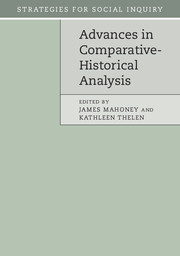Epilogue: comparative-historical analysis: past, present, future
Published online by Cambridge University Press: 05 July 2015
Summary
According to Mahoney and Rueschemeyer (2003), comparative-historical analysis looks for “historically grounded explanations of large-scale and substantively important outcomes” (4). It aims at the “identification of causal configurations that produce major outcomes of interest” (11), paying explicit attention to “historical sequences” while “take[ing] seriously the unfolding of processes over time” (12) and relying on “systematic and contextualized comparison of similar and contrasting cases” (13). In the same vein, Thelen and Mahoney, in their introductory chapter to the present volume, characterize comparative-historical analysis by “its focus on macro configurational explanation” and on “problem-driven case-based research” as well as “its commitment to temporally oriented analysis.”
In this essay I undertake to place comparative-historical analysis in the context of the history of the social sciences, to show where it comes from and where not, what if anything is new or unique about it, and in what respects it differs from or resembles classical traditions of inquiry. My objective is to clarify some of the foundational assumptions underlying present-day comparative- historical analysis through comparison with similar but different approaches, historical and contemporary. My central claim is that comparative-historical analysis rests on a particular ontology of the social world that is historically new and characteristically unlike the ontologies underlying other, related modes of social science research and theory.
To begin with, comparative-historical analysis assumes that there are large (“macro”) social structures in the real world (“societies”) that can be classified into categories, or families, of “cases” similar in some respects while differing in others. Examples of families of cases for comparative-historical analysis are nation-states, supranational or subnational regions, local communities, sectoral or international regimes, local or national economies, and institutionalized religions, cultures, and value systems. Cases are seen as subject to a historical dynamic; rather than being fixed once and for all, they are changing over time. Furthermore, some of the differences between cases, cross-sectional as well as diachronic, are considered fundamental: they are assumed to matter in ways important enough to justify systematic efforts at understanding not just their present consequences but also their origins.
- Type
- Chapter
- Information
- Advances in Comparative-Historical Analysis , pp. 264 - 288Publisher: Cambridge University PressPrint publication year: 2015
References
- 6
- Cited by

